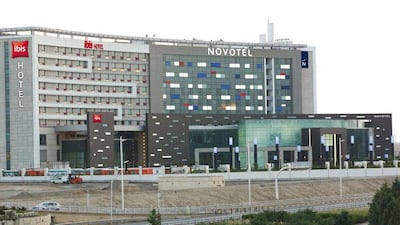France’s Accor Hotels will become the first international hotel operator to enter Iran in 35 years as it banks on the easing of sanctions.
It will operate the 296-room Novotel Ikia and 196-room ibis Ikia at the Imam Khomeini International Airport from next month. It has signed a management agreement with Aria Ziggurat Tourism Development, a member of the Iranian holding company Tourism Financial Group.
“Since the positive events of July [this year] we now feel it is the right time to start moving to Iran and develop our business there,” said Christophe Landais, the chief operating officer of Accor Hotels in the Middle East.
Iran agreed to a joint comprehensive plan of action (JCPA) in July over its disputed nuclear programme but the agreement is yet to be approved by the parliaments of all six participating countries – China, France, Russia, the United Kingdom, the United States and Germany. US Congress is expected to vote by tomorrow on a deal. Moreover, Iran has to comply with JCPA obligations. If it does so, sanctions could be lifted as early as the first half of next year.
The move is expected to provide a major boost for Iran’s economy.
“Hotel development takes time, and it is never too soon to begin exploring a new market with such high potential as we believe Iran clearly demonstrates,” Mr Landais said.
“We see tremendous opportunity for growth in Iran, as there is now a crucial need to rejuvenate the hospitality industry to international standards and build and develop more hotels throughout this large market.”
International hotel operators left the Iranian market in 1979 after the Islamic revolution. Since then the country has been under international sanctions, which tightened over the past five years, closing international capital markets and access to foreign investors.
As Iran’s real GDP growth turned negative in 2012 and 2013, inflation spiked and the local currency depreciated, with few investments made in the private sector, according to a Standard & Poor’s report released yesterday.
Abu Dhabi’s Rotana is already looking to operate four hotels in Tehran and Mashhad by the end of 2018.
“With Dubai being the regional hub for most international operators, it is a short flight to, say Tehran, to provide the necessary support, especially in the early years before there is sufficient critical mass to justify a more significant presence on the ground,” said John Podaras, a partner at the hospitality consultancy Hotel Development Resources in Dubai.
“Iranian land owners will also benefit from investors who use the UAE as a regional base and are looking for viable developing markets to expand into against regional instability in many of the more traditional investment areas.”
Iran was the eighth-largest source market for tourists to Dubai last year, contributing 3 per cent of all tourists, according to Dubai’s Department of Tourism and Commerce Marketing.
Iran’s oil exports could rebound to pre-2012 sanction levels within eight to 12 months, according to the World Bank. By restoring access to the global financial markets, it could attract foreign direct investment of about US$3 billion over 2016 and 2017.
“The UAE and China are likely to be the first beneficiaries from sanctions lifting given their existing relationships with Iran as they contribute to around two-thirds of Iranian imports,” the S&P report said.
The UAE imported goods worth Dh4.5bn from the country last year, slightly down from the previous year at Dh4.9bn, according to the UAE Ministry of Economy. It exported non-oil goods worth Dh1.9bn last year, down from Dh2.6bn in 2013.
Emirates started flying to Mashhad, Iran’s second-largest city, this month. It also flies to Tehran. Etihad, flydubai and Air Arabia all have existing networks in the country.
In the year ending March, about 4.8 million tourists visited Iran and stayed at its 640 hotels, according to TRI Consulting.
ssahoo@thenational.ae
Follow The National's Business section on Twitter

